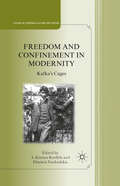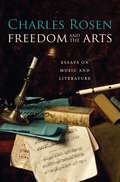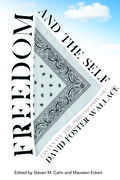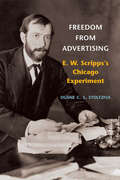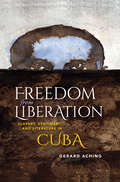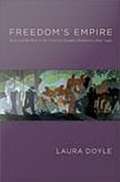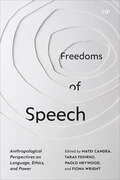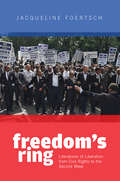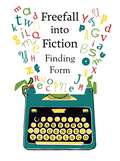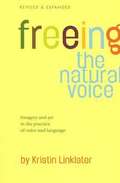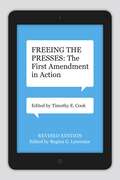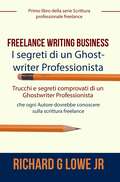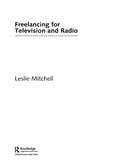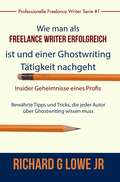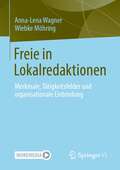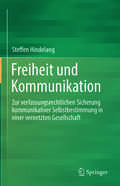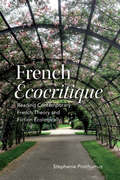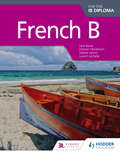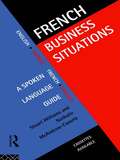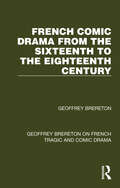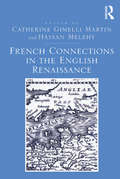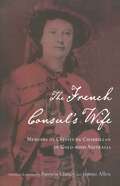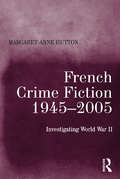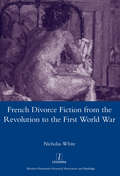- Table View
- List View
Freedom and Confinement in Modernity
by Dimitris Vardoulakis A. Kiarina KordelaKafka's literary universe is organized around constellations of imprisonment. Freedom and Confinement in Modernity proposes that imprisonment does not signify a tortured state of the individual in modernity. Rather, it provides a new reading of imprisonment suggesting it allows Kafka to perform a critique of a modernity instead.
Freedom and the Arts: Essays on Music and Literature
by Charles RosenIs there a moment in history when a work receives its ideal interpretation? Or is negotiation always required to preserve the past and accommodate the present? The freedom of interpretation, Charles Rosen suggests in these sparkling explorations of music and literature, exists in a delicate balance with fidelity to the identity of the original work. Rosen cautions us to avoid doctrinaire extremes when approaching art of the past. To understand Shakespeare only as an Elizabethan or Jacobean theatergoer would understand him, or to modernize his plays with no sense of what they bring from his age, deforms the work, making it less ambiguous and inherently less interesting. For a work to remain alive, it must change character over time while preserving a valid witness to its earliest state. When twentieth-century scholars transformed Mozart's bland, idealized nineteenth-century image into that of a modern revolutionary expressionist, they paradoxically restored the reputation he had among his eighteenth-century contemporaries. Mozart became once again a complex innovator, challenging to perform and to understand. Drawing on a variety of critical methods, Rosen maintains that listening or reading with intensity-for pleasure-is the one activity indispensable for full appreciation. It allows us to experience multiple possibilities in literature and music, and to avoid recognizing only the revolutionary elements of artistic production. By reviving the sense that works of art have intrinsic merits that bring pleasure, we justify their continuing existence.
Freedom and the Self
by Steven M. Cahn Maureen EckertThe book Fate, Time, and Language: An Essay on Free Will, published in 2010 by Columbia University Press, presented David Foster Wallace's challenge to Richard Taylor's argument for fatalism. In this anthology, notable philosophers engage directly with that work and assess Wallace's reply to Taylor as well as other aspects of Wallace's thought.With an introduction by Steven M. Cahn and Maureen Eckert, this collection includes essays by William Hasker (Huntington University), Gila Sher (University of California, San Diego), Marcello Oreste Fiocco (University of California, Irvine), Daniel R. Kelly (Purdue University), Nathan Ballantyne (Fordham University), Justin Tosi (University of Arizona), and Maureen Eckert. These thinkers explore Wallace's philosophical and literary work, illustrating remarkable ways in which his philosophical views influenced and were influenced by themes developed in his other writings, both fictional and nonfictional. Together with Fate, Time, and Language, this critical set unlocks key components of Wallace's work and its traces in modern literature and thought.
Freedom and the Self: Essays on the Philosophy of David Foster Wallace
by Steven M. Cahn Eckert MaureenThe book Fate, Time, and Language: An Essay on Free Will, published in 2010 by Columbia University Press, presented David Foster Wallace's challenge to Richard Taylor's argument for fatalism. In this anthology, notable philosophers engage directly with that work and assess Wallace's reply to Taylor as well as other aspects of Wallace's thought.With an introduction by Steven M. Cahn and Maureen Eckert, this collection includes essays by William Hasker (Huntington University), Gila Sher (University of California, San Diego), Marcello Oreste Fiocco (University of California, Irvine), Daniel R. Kelly (Purdue University), Nathan Ballantyne (Fordham University), Justin Tosi (University of Arizona), and Maureen Eckert. These thinkers explore Wallace's philosophical and literary work, illustrating remarkable ways in which his philosophical views influenced and were influenced by themes developed in his other writings, both fictional and nonfictional. Together with Fate, Time, and Language, this critical set unlocks key components of Wallace's work and its traces in modern literature and thought.
Freedom from Advertising: E. W. Scripps's Chicago Experiment (History of Communication)
by Duane C.S. StoltzfusDisgusted by publishers and editors who refused to cover important stories for fear of offending advertisers, the press baron E. W. Scripps rejected conventional wisdom and set out to prove that an ad-free newspaper could be profitable entirely on circulation. Duane C. S. Stoltzfus’s Freedom from Advertising details the history of Scripps’s innovative 1911 experiment, which began in Chicago amid great secrecy. The tabloid-sized newspaper was called the Day Book, and at a penny a copy, it aimed for a working-class market, crusading for higher wages, more unions, safer factories, lower streetcar fares, and women’s right to vote. It also tackled the important stories ignored by most other dailies, like the labor conflicts that shook Chicago in 1912. Though the Day Book’s financial losses steadily declined over the years, it never became profitable, and publication ended in 1917. Nevertheless, Stoltzfus explains that the Day Book served as an important ally of workers, a keen watchdog on advertisers, and it redefined news by providing an example of a paper that treated its readers first as citizens with rights rather than simply as consumers.
Freedom from Liberation: Slavery, Sentiment, and Literature in Cuba (Blacks in the Diaspora)
by Gerard Aching“Delves into the life and work of Juan Francisco Manzano, the enslaved Cuban poet and author of Spanish America’s only known slave narrative . . . Valuable.” —ChoiceBy exploring the complexities of enslavement in the autobiography of Cuban slave-poet Juan Francisco Manzano (1797–1854), Gerard Aching complicates the universally recognized assumption that a slave’s foremost desire is to be freed from bondage. As the only slave narrative in Spanish that has surfaced to date, Manzano’s autobiography details the daily grind of the vast majority of slaves who sought relief from the burden of living under slavery. Aching combines historical narrative and literary criticism to take the reader beyond Manzano’s text to examine the motivations behind anticolonial and antislavery activism in pre-revolution Cuba, when Cuba’s Creole bourgeoisie sought their own form of freedom from the colonial arm of Spain.
Freedom's Empire: Race and the Rise of the Novel in Atlantic Modernity, 1640-1940
by Laura DoyleIn this pathbreaking work of scholarship, Laura Doyle reveals the central, formative role of race in the development of a transnational, English-language literature over three centuries. Identifying a recurring freedom plot organized around an Atlantic Ocean crossing, Doyle shows how this plot structures the texts of both African-Atlantic and Anglo-Atlantic writers and how it takes shape by way of submerged intertextual exchanges between the two traditions. For Anglo-Atlantic writers, Doyle locates the origins of this narrative in the seventeenth century. She argues that members of Parliament, religious refugees, and new Atlantic merchants together generated a racial rhetoric by which the English fashioned themselves as a "native," "freedom-loving," "Anglo-Saxon" people struggling against a tyrannical foreign king. Stories of a near ruinous yet triumphant Atlantic passage to freedom came to provide the narrative expression of this heroic Anglo-Saxon identity--in novels, memoirs, pamphlets, and national histories. At the same time, as Doyle traces through figures such as Friday in Robinson Crusoe, and through gothic and seduction narratives of ruin and captivity, these texts covertly register, distort, or appropriate the black Atlantic experience. African-Atlantic authors seize back the freedom plot, placing their agency at the origin of both their own and whites' survival on the Atlantic. They also shrewdly expose the ways that their narratives have been "framed" by the Anglo-Atlantic tradition, even though their labor has provided the enabling condition for that tradition. Doyle brings together authors often separated by nation, race, and period, including Aphra Behn, Eliza Haywood, Olaudah Equiano, Nathaniel Hawthorne, Harriet Wilson, Pauline Hopkins, George Eliot, and Nella Larsen. In so doing, she reassesses the strategies of early women novelists, reinterprets the significance of rape and incest in the novel, and measures the power of race in the modern English-language imagination.
Freedoms of Speech: Anthropological Perspectives on Language, Ethics, and Power (Studies in the Anthropology of Language, Sign, and Social Life)
by Fiona Wright Paolo Heywood Matei Candea Taras FedirkoBringing together leading anthropologists, this collection sheds light on the vast topic of freedoms of speech from a comparatively human perspective. Freedoms of Speech provides a sustained, empirical exploration of the variety of ways freedom of speech is lived, valued, and contested in practice; envisioned as an ideal; and mediated by various linguistic, ethical, and material forms. From Ireland to India, from Palestine to West Papua, from contemporary Java to early twentieth-century Britain, and from colonial Vietnam to the contemporary United States, the book broadly interrogates the classic vision of a singular “Western liberal tradition” of freedom of speech, exploring its internal complexities and highlighting alternative perspectives on the relationship between speech, freedom, and constraint in other times and places. Chapters analyse subjects commonly linked to freedom-of-speech debates, shedding new light on familiar topics that include campus speech codes, defamation, and press freedom, while also exploring unexpected ones such as therapy, gift-giving, and martyrdom. These analyses not only provide unexpected perspectives and unique insights but also address a myriad of questions, contributing to a rich, interdisciplinary, and human understanding of the nature of freedom of speech.
Freedom’s Ring: Literatures of Liberation from Civil Rights to the Second Wave
by Jacqueline FoertschFreedom’s Ring examines the debate between “freedom” and “equality” in popular texts from the Black Power, antiwar/ counterculture, and women’s liberation movements of the 1960s and 1970s. Its central finding is that although many struggled and died for it in the civil rights era, freedom (e.g., the vote, integrated bus rides, sex without consequences via the Pill) is ultimately free—costing officialdom little if anything to fully implement—while equality (with respect to jobs, salaries, education, housing, and health care) will forever be the much more expensive nut to crack.
Freefall into Fiction: Finding Form
by Barbara Turner-VesselagoBarbara Turner-Vesselago's first book, Writing Without a Parachute, showed writers how to fall in love with writing. This new book builds on this experience and encourages writers to pursue their work with intention and without inhibition. Freefall into Fiction: Finding Form is designed to help writers, step-by-step, to create publishable short stories, novels and memoirs by finding their own unique balance between the exploration offered by Freefall Writing and the requirements of each particular genre. This book penetrates deep inside the writing process where that balancing act takes place.
Freeing The Natural Voice: Imagery And Art In The Practice Of Voice And Language
by Kristin Linklater Andre SlobDescribes the mechanics of the voice and obstacles of spontaneous, effective vocal expression and details exercises for developing and strengthening the voice as a human and actor's instrument.
Freeing the Presses: The First Amendment in Action (Media & Public Affairs)
by Regina G. Lawrence Timothy E. Cook"A thoughtful, provocative, and timely account of the meaning of a free press in the United States." -- American Journal of Political ScienceMost Americans consider a free press essential to democratic society -- -either as an independent watchdog against governmental abuse of power or as a wide-open marketplace of ideas. But few understand that far--reaching public policies have shaped the news citizens receive. With contributions from leading scholars in the fields of history, legal scholarship, political science, and communications, this revised and updated edition of Freeing the Presses offers an in-depth inquiry into the theory and practice of journalistic freedom. In addition to a new foreword by Regina G. Lawrence and afterword by Laura Stein, Freeing the Presses presents fresh and timely analyses of the complexities of news media and politics.
Freelance Writing Business - I segreti di un Ghostwriter Professionista
by Richard G Lowe Jr Cristina MantionePensi di poter diventare uno scrittore freelance e vorresti di lavorare per gli altri. Beh, il ghostwriting è un lavoro duro! Tuttavia, quando è gestito propriamente, il ghostwriting può rivelarsi uno dei lavori freelance più redditizi, nel campo della scrittura. Questo manuale illustra i passaggi necessari per gestire con successo un progetto di ghostwriting, dai primi contatti con un potenziale cliente fino alla consegna del progetto completo. Analizzerà in dettaglio le potenziali insidie, insieme a suggerimenti e soluzioni. Inoltre, tratterà questi argomenti: * Stabilire il prezzo di un progetto di ghostwriting * Iniziare questo lavoro * Gestire le riunioni con il cliente * Effettuare interviste e ricerche * Perchè la comunicazione è particolarmente importante * Redigere uno Stato Avanzamento dei Lavori per tutelare te stesso e il tuo cliente * Gestire le revisioni * Consegnare il progetto
Freelancing for Television and Radio
by Leslie MitchellFrom an experienced author in the field, this indispensable guide presents everything needed to create and maintain a successful freelancing career in the world of television and radio. Whether the reader is studying the field, considering their options, or currently employed as a freelance media professional, this book not only gives a brief overview of all areas, but also explains what it means to be freelance in the world of the audio-visual industry. Drawing upon real-life experiences of freelancers and freelance employers, all aspects of the job are detailed, from an outline of tax and employment issues to an analysis of the skills needed to succeed, and all the pitfalls, problems and opportunities which a career in this sector affords are clearly presented. Including: practical advice on how to start, where to find work, writing your CV and networking assessments of related sectors and their opportunities, e.g. facilities and video production an important section on developing and maintaining a freelance career key information on the challenges and responsibilities of setting up a small business a significant chapter on the basics of writing and submitting programme proposals to broadcasters useful contact information. Freelancing for TV and Radio is an absolute must for students of media studies and anyone considering, or already building a career in this hugely popular and fast-growing industry.
Freiberuflich Schreiben - Insider-Geheimnisse eines professionellen Ghostwriters
by Richard G Lowe Jr Raphael D. ThöneFreiberuflich Schreiben - Insider-Geheimnisse eines professionellen Ghostwriters von Richard G Lowe Jr Gut gemanagt und angemessen berechnet kann Ghostwriting eine der lukrativsten freiberuflichen Tätigkeiten als Autor darstellen. Sie möchten also ein freiberuflicher Autor sein und interessieren sich für Ghostwriting. Nun, Ghostwriting ist harte Arbeit! In der Tat kann Ghostwriting, gut gemanagt und angemessen berechnet, eine der lukrativsten freiberuflichen Tätigkeiten als Autor darstellen. Dieses Buch beschreibt alle Schritte, wie ein erfolgreiches Ghostwriting Projekt ablaufen muss, angefangen vom ersten Kontakt mit einem potentiellen Kunden bis hin zum Abschluss des fertigen Manuskripts. Mögliche Fallstricke werden detailliert besprochen, zusammen mit Lösungsansätzen und Vorschlägen. Hier ist eine Zusammenfassung dessen, was Sie alles lernen werden: * wie berechne ich ein Ghostwriting Projekt, * wie begründe ich eine geschäftliche Ghostwriting-Tätigkeit, * wie laufen Besprechungen mit den Kunden ab, * wie führe ich Interviews und Recherchen durch, * warum Kommunikation so besonders wichtig ist, * wie die Erstellung einer Leistungsbeschreibung meinen Kunden und mich schützen kann, * wie man mit unvermeidlichen Änderungen umgeht, * wie man das abgeschlossene Projekt abgibt.
Freie in Lokalredaktionen: Merkmale, Tätigkeitsfelder und organisationale Einbindung
by Wiebke Möhring Anna-Lena WagnerIm Fokus dieser Studie stehen haupt- und nebenberufliche freie Mitarbeiter:innen in Lokalredaktionen von Tageszeitungen und ihren Onlineablegern. Eingesetzt wird ein Mehrmethodenansatz von qualitativen und quantitativen Befragungen, die auf einem sozialintegrativen Theoriemodell basieren. In dem vorliegenden Buch werden die Ergebnisse dieser Befragungen aus Akteurs- und Redaktionsperspektive systematisiert und vorgestellt. Im Zentrum stehen so unter anderem die journalistischen Qualifikationen der Freien, ihre Beziehung zur Lokalredaktion und zur lokalen Umwelt, redaktionelle Richtlinien und Qualitätssicherungsmaßnahmen.
Freiheit und Kommunikation: Zur verfassungsrechtlichen Sicherung kommunikativer Selbstbestimmung in einer vernetzten Gesellschaft
by Steffen HindelangDieses Buch gibt Antworten darauf, wie in Zeiten von Facebook und Fake News der verfassungsrechtliche Schutz des freien öffentlichen Diskurses gelingen kann. Es untersucht, wie die Verfassung auf einen nicht mehr nur durch Rundfunk und Presse klassischen Zuschnitts, sondern auch durch eine Vielzahl Einzelner organisierten massenmedialen Diskurs reagiert und wie das Verständnis der den Diskurs prägenden verfassungsrechtlichen Bausteine aktualisiert werden kann.Die technischen und wirtschaftlichen Bedingungen massenmedialer Kommunikation haben sich fundamental gewandelt. Das vorherrschende verfassungsdogmatische Schutzkonzept – ein „Ersatzmodell von Freiheit“ – kann diesem Wandel nicht ausreichend Rechnung tragen. Der Einzelne muss heute nicht mehr nur vor, sondern auch in seiner Medienmacht geschützt werden. Ausgehend von kommunikationswissenschaftlichen Erkenntnissen wird ein verfassungsrechtliches Verständnis entwickelt, das den Einzelnen wieder ins Zentrum eines freien massenmedialen Diskurses rückt.
French 'Ecocritique': Reading French Theory and Fiction Ecologically
by Stephanie PosthumusFrench Écocritique is the first book-length study of the culturally specific ways in which contemporary French literature and theory raise questions about nature and environment. Stephanie Posthumus’s ground-breaking work brings together thinkers such as Guattari, Latour, and Serres with recent ecocritical theories to complicate what might otherwise become a reductive notion of "French ecocriticism." Working across contemporary philosophy and literature, the book defines the concept of the ecological as an attentiveness to specific nature-culture contexts and to a text’s many interdiscursive connections. Posthumus identifies four key concepts, ecological subjectivity, ecological dwelling, ecological politics, and ecological ends, for changing how we think about human-nature relations. French Écocritique highlights the importance of moving beyond canonical ecocritical texts and examining a diversity of cultural and literary traditions for new ways of imagining the environment.
French B for the IB Diploma Student Book
by Jane Byrne Damian Henderson Sophie JobsonA new, accessible guide to French B from IB experts and native speakers, French B for the IB Diploma responds to teacher needs by providing texts and skills practice at the right level for all students for all core and optional topics.Clear learning pathways provide routes through the book for both Standard and Higher Level students ensuring maximum language progression. This Student Book:- develops text handling skills for Paper 1 through carefully crafted reading tasks based around the main text types- provides plenty of writing practice that mirrors the skills and styles needed for Paper 2 (written production)- offers opportunities to encourage speaking skills with a wealth of visual stimulus- promotes global citizenship and an appreciation of the Francophone world through a wide range of cultural material and questioning- signposts links and references to Theory of KnowledgeAlso available:French B for the IB Diploma Dynamic Learning (ISBN 9781471804731)Teacher planning, student resources, assessment material and audio, all easily accessible, anytime, anywhere.French B for the IB Diploma Dynamic Learning Whiteboard Edition (ISBN 9781471804212).
French Business Situations: A Spoken Language Guide (Business Situations Ser.)
by Stuart Williams Nathalie McAndrew CazorlaFrench Business Situations is a handy reference and learning text for all those who use or need spoken French for business. It is suitable for self-study or class use. Over 40 spoken situations are simply presented, including: * Basic phone calls * Leaving messages * Making presentations * Comparing, enquiring, booking * Selling techniques With full English translations and brief usage notes, this guide will help the user communicate confidently in a broad range of everyday situations.
French Comic Drama from the Sixteenth to the Eighteenth Century (Geoffrey Brereton on French Tragic and Comic Drama)
by Geoffrey BreretonIn tracing the course of French comedy from the Renaissance, through the age of Louis XIV and the eighteenth century, to the eve of the Revolution, originally published in 1977, Geoffrey Brereton shows how it evolved from the crude farces and experimental plays of the sixteenth century to become a rich and highly sophisticated dramatic genre. The main emphasis is on the work of the principal dramatists, notably Molière (whose plays and career are given a detailed and enlightening treatment), Corneille, Scarron, Marivaux and Beaumarchais, with some space devoted to the more neglected writers, such as the ‘cynical generation’ of Dancourt, Regnard, Lesage and others; and all the plays are seen in the context of the theatrical conventions that helped to shape them. Different types of comedy are analysed, including comedy of character and of manners, as well as the romantic, burlesque and bourgeois forms and the development of the opéra-comique. At the same time Dr Brereton examines the influences on French comedy – influences as varied as those of the farce, the Italian commedia dell’arte, the Spanish comedia and the eighteenth century drame – and the way in which these were absorbed and exploited by French comic dramatists. Since comedy, more than any other kind of drama, reflects the contemporary social scene, attention is drawn to social conditions and attitudes, and some of the more striking parallels with modern social preoccupations are pointed out. Written in a very lively and readable style, and containing much stimulating and original comment, as well as providing the basic facts, it gives a considerable insight into the nature of French comedy during its most formative and fruitful period. A substantial bibliography and other reference material increase the usefulness of this book to the student of French drama.
French Connections in the English Renaissance
by Hassan Melehy Catherine Gimelli MartinThe study of literature still tends to be nation-based, even when direct evidence contradicts longstanding notions of an autonomous literary canon. In a time when current events make inevitable the acceptance of a global perspective, the essays in this volume suggest a corrective to such scholarly limitations: the contributors offer alternatives to received notions of 'influence' and the more or less linear transmission of translatio studii, demonstrating that they no longer provide adequate explanations for the interactions among the various literary canons of the Renaissance. Offering texts on a variety of aspects of the Anglo-French Renaissance instead of concentrating on one set of borrowings or phenomena, this collection points to new configurations of the relationships among national literatures. Contributors address specific borrowings, rewritings, and appropriations of French writing by English authors, in fields ranging from lyric poetry to epic poetry to drama to political treatise. The bibliography presents a comprehensive list of publications on French connections in the English Renaissance from 1902 to the present day.
French Consul's Wife: Memoirs of Celeste De Chabrillan in Gold-rush Australia
by Patricia Clancy Jeanne Allen'What a subject for a film, but not, please, Meryl Streep ... Together with Dr Patricia Clancy (Melbourne University) and Jeanne Allen's (La Trobe University) elegant translation and able notes, the memoirs make for a piquant, informative, variegated and often startling read ... Miegunyah Press you've done it again.' (Derek Whitelock, Weekend Australian)A former Parisian courtesan, circus performer and dancer, C�leste de Chabrillan scandalised Melbourne society when she arrived in 1854 as the wife of the French Consul. These memoirs give a vivid firsthand account of the two-and-a-half years she spent in gold-rush Victoria.C�leste's arrival in Melbourne was preceded by the publication of her memoirs describing her illegitimate birth, miserable adolescence and celebrity career as a courtesan, bareback rider and polka dancer. As a result she was dubbed the consul's 'harlot spouse' and ostracised by society.Despite this, C�leste did not avoid the public gaze and continued to employ her literary talents. Her memoirs are of a life spent in the village of St Kilda, the diplomatic and government house circle and the Ballarat gold fields. Her descriptions of a public hanging, Governor Hotham's 'beer ball' and her own Ball for the Victims of Crimea reveal her as a woman of great energy and wilful temperament.
French Crime Fiction, 1945–2005: Investigating World War II
by Margaret-Anne HuttonIn the first major study of representations of World War II in French crime fiction, Margaret-Anne Hutton draws on a corpus of over a hundred and fifty texts spanning more than sixty years. Included are well-known writers (male and female) such as Aubert, Simenon, Boileau-Narcejak, Vargas, Daeninckx, and Jonquet, as well as a broad range of lesser-known authors. Hutton's introduction situates her study within the larger framework of literary representations of World War II, setting the stage for her discussions of genre; the problem of defining crimes and criminals in the context of the war; the epistemological issues that arise in the relationship between World War II historiography and the crime novel; and the temporal textures linking past crimes to the present. Filling a gap in the fields of crime fiction and fictional representations of the War, Hutton's book calls into question the way both crime fiction and the French theatre of World War II have been conceptualized and codified.
French Divorce Fiction from the Revolution to the First World War
by Nicholas White"One of the primary social changes ushered in by the French Revolution was the legalization of divorce in 1792. Diluted by the Civil Code and suppressed by the Restoration, divorce was only fully established in France by the Loi Naquet of 1884. French Divorce Fiction from the Revolution to the First World War tracks the part played by novels in this conflict between the secular rights of individual citizens and the sanctity of the traditional family. Inspired by the sociologists Zygmunt Bauman and Anthony Giddens, White's account culminates in the first sustained analysis of the role of divorce in the refashioning of life narratives during the early decades of the Third Republic. As such, it redefines the relationships between canonical authors such as Maupassant and Colette, rediscovered women novelists like Marcelle Tinayre and Camille Pert, and long-neglected patriarchs such as Paul Bourget and Anatole France. Nicholas White teaches French in the University of Cambridge where he is a Fellow of Emmanuel College."
